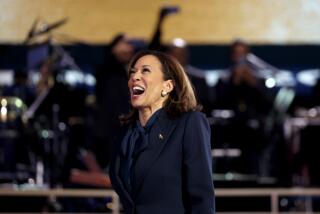‘92 DEMOCRATIC CONVENTION : Jordan’s Words Seen as a Shock to Blacks : Keynote: Feeling betrayed, some see ex-lawmaker’s attack on ‘black racism’ as a ploy to boost white vote.
- Share via
NEW YORK — Rather than recalling memories of her stirring oration at the 1976 Democratic National Convention, former Texas Rep. Barbara Jordan’s remarks this week on racial intolerance left many blacks “shocked, saddened and confused,” in the words of one African-American leader.
Jordan was the sole black among three convention keynote speakers on Monday night. She had been chosen by presidential nominee Bill Clinton to convey the vision of racial harmony proposed by his potential Democratic Administration.
But some blacks said Jordan’s condemnation of “both white racism and black racism” evoked a distressing echo of Clinton’s recent denunciation of black rapper Sister Souljah. That move was widely perceived by blacks as a racially motivated ploy to shore up the candidate’s support among conservative white voters.
No one predicts Jordan’s remarks will generate anything near the level of intense anger and division that Clinton prompted with his June comments about Sister Souljah. Clinton spoke at that time about black rage and retaliation against whites as examples of black racism. Yet the nerve that Jordan touched by mentioning black racism reflects the difficulty Clinton can expect to encounter throughout his campaign as he attempts to reshape old-line Democratic positions on race relations.
While Clinton repeatedly stresses racial harmony as one of the key goals of his campaign, many blacks worry about his emphasis on increased personal responsibility as the flip side of greater government involvement in social issues. They say this could serve as a cover for an effort to reverse hard-earned black political gains.
As black conventioneers mulled over Jordan’s speech, many reiterated the concern expressed by Jewell Jackson McCabe, founder and chairwoman of the National Coalition of 100 Black Women, a 7,000-member advocacy group.
“(Jordan) was carrying the water of the strategists that want to bring us back to the right of center in the (Democratic) party,” said McCabe. “It was as though she--a black woman, one of my role models and heroes--was carrying the message of white men to black people. I was shocked, saddened and confused because I didn’t understand what she meant or why she would say that.”
In her speech, Jordan urged all Americans to embrace the social, political and racial change called for in the 1992 Democratic platform.
“We are one, we Americans, and we reject any intruder who seeks to divide us by race or class,” she said. “We seek to unite people, not divide them, and we reject both white racism and black racism. This party will not tolerate bigotry under any guise.”
James Steele, a political scientist at Howard University in Washington, said Jordan’s speech--while “eloquent and very academic”--lacked the evidence to support her suggestion that black racism is a national problem for whites.
Reflecting a common opinion among U.S. blacks, he said black Americans are incapable of exercising racist views because they lack the power to put whites at a disadvantage.
“What is black racism?” Steele asked. “If she means that some blacks hold prejudiced views against whites, I agree with her. But that’s not racism. Racism is power. Under what guise can blacks exercise power to hurt the white population? What institutions do we control to deny whites jobs or housing or social advancement?
“By criticizing blacks for being racist,” he continued, “she is apologizing (to whites) for something that doesn’t exist.”
Not all blacks agree with such an analysis. For instance, Eddie Williams of the Joint Center for Political and Economic Studies, a Washington-based think tank that specializes in racial issues, says the view that racism and power are linked is “illogical.”
“Racism has nothing to do with power,” he said. “It has to do with attitudes. I know white racists and I know black racists. To say that blacks can’t be racist is to excuse a lot of black behavior without holding them accountable for it.”
Williams also said he considered Jordan’s speech a “watershed” in black political thinking because it represented the end of extreme liberal positions that, in his view, have kept Democrats out of the White House.
“Nothing can be done to fulfill a commitment (to black political progress) unless you win,” he said.
Underscoring the divergent vantage points from which whites and blacks can often view the same event, some Clinton aides voiced mild disappointment with Jordan’s speech for reasons that have nothing to do with race. She never uttered the candidate’s name--causing some speculation that she was distancing herself from Clinton’s political views--and her delivery was seen by some as pedantic.
“It was like she was reading her seminar notes,” one disappointed Clinton aide said of her oration. “It just didn’t go anywhere.”
Dee Dee Myers, Clinton’s campaign spokeswoman, said the nominee’s staff had no role in preparing Jordan’s speech or the keynote address delivered by New Jersey Sen. Bill Bradley. Clinton staff members did assist the third keynoter, Georgia Gov. Zell Miller.
More to Read
Get the L.A. Times Politics newsletter
Deeply reported insights into legislation, politics and policy from Sacramento, Washington and beyond. In your inbox twice per week.
You may occasionally receive promotional content from the Los Angeles Times.









